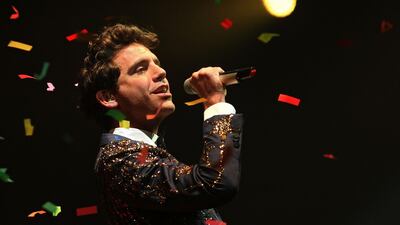Mika promised a special tribute for Beirut this weekend and he delivered.
The British-Lebanese pop star produced and headlined a star-studded online concert filled with emotion and jubilation.
Available on Mika's YouTube channel, I Love Beirut is more than a traditional concert film. It blends music-video aesthetics and documentary journalism to produce a soulful love letter to the city of his birth.
Joining him from around the world – Beirut, London, Rome and Los Angeles – were nearly a dozen singers including Kylie Minogue, Rufus Wainwright and Lebanese artists such as poet Etel Adnan and indie group Mashrou’ Leila.
With slick production, local and international settings and Mika – the consummate performer and host – I Love Beirut is a stirring tribute to a resilient city picking itself up from the wreckage.
Here are five takeaways from the event:
1. It grabs the heart from the start
Mika has often spoken about his affection for Beirut, but he has never described that relationship as eloquently as in the tear-jerking opening monologue for the programme.
Over images of the city’s extensive destruction, including the shattered windows and scarred walls of the Gemmayzeh and Achrafieh neighbourhoods, Mika details what the city means to him.
“Your beauty and strength cradled me as an infant and has stayed with me ever since,” he says. “You have come with me everywhere and tonight it is my turn to come to you.”
Mika goes on to explain the devastation of the August 4 port blast, with “windows, walls and lives, all blown out”, before stating that “a new dawn has arrived with Beirut ready to bounce back”.
“My irrepressible Beirut. Your flame has never been extinguished, it flickers on,” he says. “You witnessed my birth under the falling bombs in 1983 but I have never forgotten that I was also born of your grandeur. My beautiful Beirut, you are not alone.”
2. The hits
After the monologue, the action moves to the Teatro Niccolini San Casciano in Florence, Italy, where Mika and a four-piece band (all practicing social distancing) launch into the euphoric opener Origin of Love.
While Mika brought all his hits, including Grace Kelly and Relax, Take It Easy, you can tell the songs were curated to send a message of joy and optimism.
Then again, Mika does not really have to try too hard to make an audience smile: his white shirt resembling an art smock and his disco dance moves will have you grinning in no time.
3. A concert packed with special guests
Mika's list of contacts is as high-powered as it is eclectic. The guest list for I Love Beirut is a reflection of the city's rich music and cultural scene and influence. Interspersed between Mika's effervescent pop is a broody take of Agnus Dei by the brilliant singer-songwriter Wainwright and a rare stripped-down performance by Minogue.
Joined by a pianist from a London studio, the disco queen turns into a torch singer with a lovely version of new single Say Something.
After a haunting Tra Te E Il Mare by Italian singer Laura Pausini, shot inside an eerily empty Colosseum, Mexican-Lebanese actress Salma Hayek joins from home to read a snippet from Khalil Gibran's poem On Beauty.
She prefaces the reading by stating that “one of the things that makes me most proud about my Lebanese heritage is the beauty of the spirit of the Lebanese people”.
The most powerful musical moment is when Mika is joined by indie band Mashrou' Leila, who filmed their part amid the wreckage of Beirut, performing Promise Land.
A pulsating plea for tolerance, the track is a reminder that many of those devastated by the blast come from disenfranchised and discriminated communities.
4. Tales of kindness
What elevates I Love Beirut above the traditional benefit concert is the inclusion of actual survivors. The musical action is occasionally interspersed with searing interviews with families as they detail their own ongoing journeys of recovery.
The stories are full of resilience and the kindness that is a trademark of the Lebanese people. Michelle Homsy, 24, whose apartment directly faced the Beirut port recalls a man on a scooter who found her bleeding on the side of the road before taking her to a nearby hospital.
“I think his scooter was white. I don’t know what his name was. I know absolutely nothing about him, just some flashes come back. I know he wore a white T-shirt because I did not want to dirty it with my blood,” she says.
“I think this man is my guarding angel ... he is my lucky star. I thank him deeply and I really wish him all the best because that man, [who] I know nothing about, changed my life and that of my family.”
I Love Beirut is full of such inspiring stories.
5. A great reception
The ultimate aim of I Love Beirut is to raise recovery funds, and hours after it first aired to European, North and South American audiences, the show is already a leading Twitter hashtag.
Social media is full of praise for the warmth and humanity of the production. Here are some of the reactions below.


